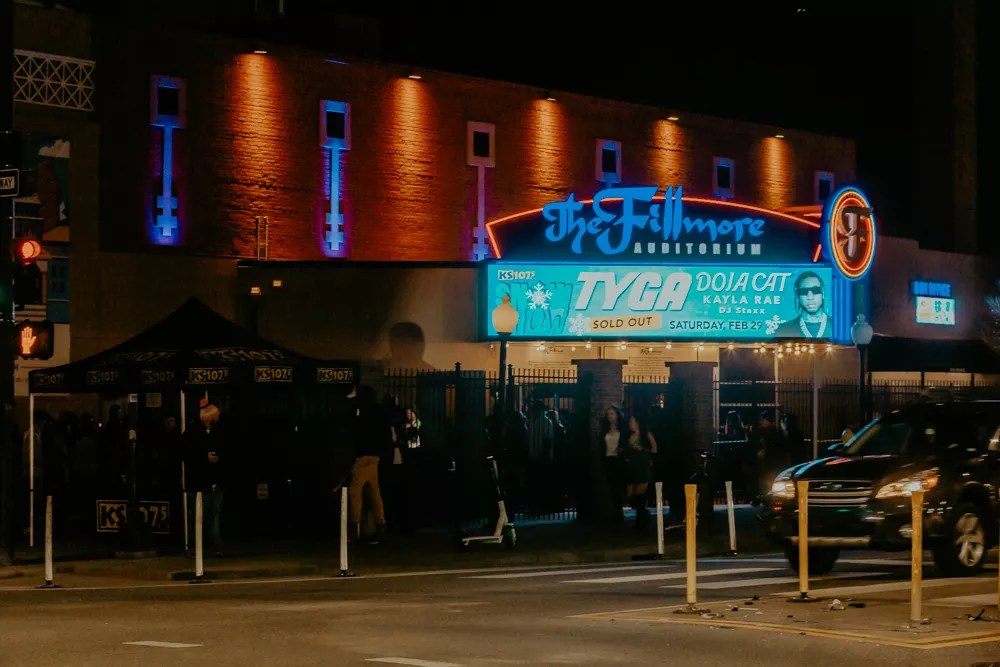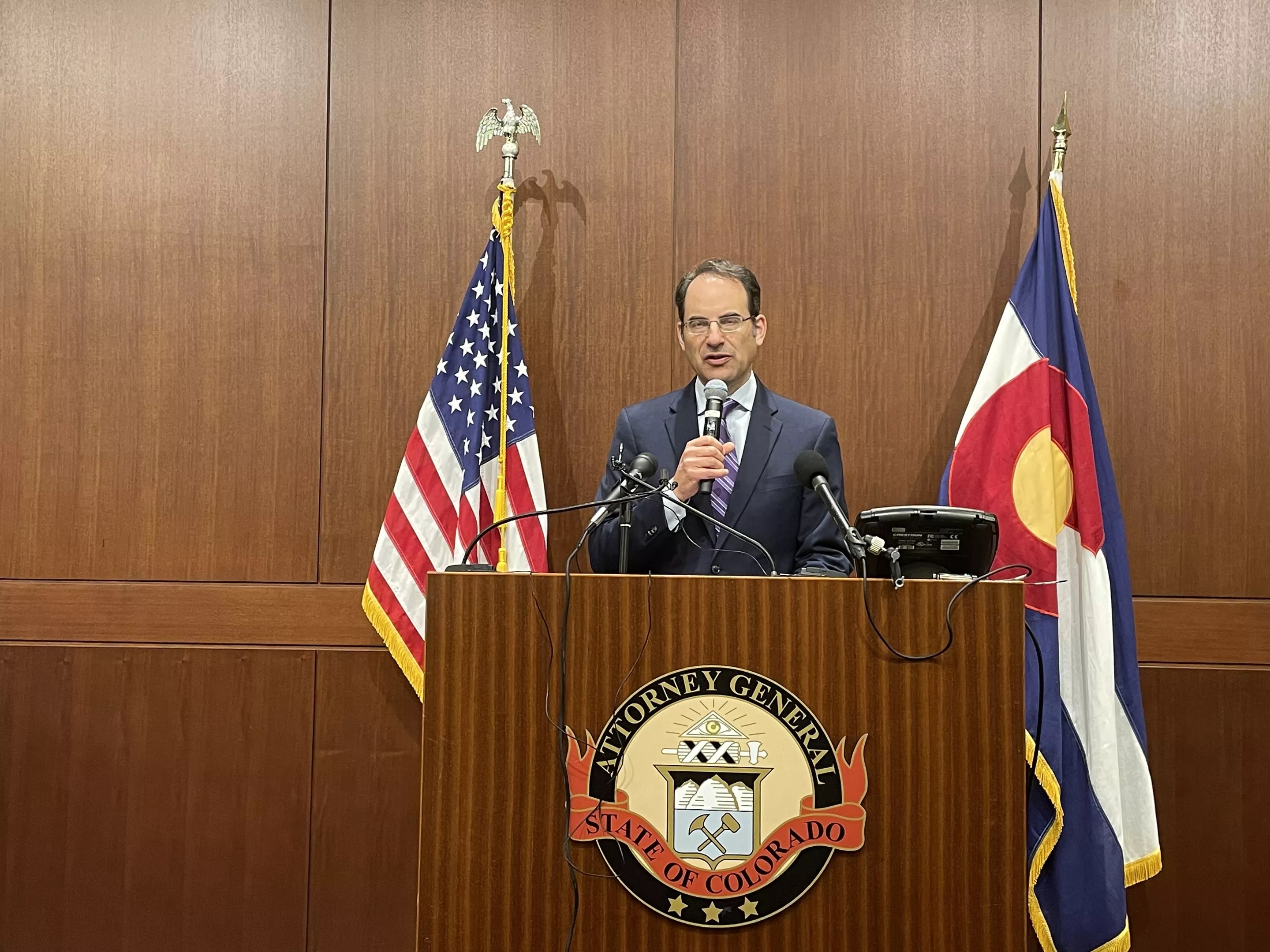
Brandon Johnson (@BJohnsonxAR)

Audio By Carbonatix
The U.S. Department of Justice, along with attorneys general from 29 states, including Colorado, and Washington, D.C., sued Live Nation Entertainment on May 23 over the company’s alleged illegal monopoly in the live-music industry, especially in concert ticketing, which it does through Ticketmaster.
Live Nation merged with Ticketmaster in 2009. The federal government approved the move at the time, but since then, the companies have expanded their reach to the point that it hurts consumers and has created an uncompetitive environment, the lawsuit contends.
The DOJ argues that Live Nation has violated the Sherman Antitrust Act by monopolizing the primary ticketing market, locking venues into unlawfully exclusive long-term agreements and only allowing those who pay for its promotion and ticketing services to perform at its venues. The department is asking the court to demand that Live Nation divest from Ticketmaster and to ban Live Nation from employing anticompetitive practices.
“Public frustration with concert ticket pricing and sales is a constant drumbeat,” the lawsuit reads. “Any fan who has logged onto Ticketmaster’s website to buy a concert ticket knows the feeling of shock and frustration as the base cost of the ticket increases dramatically with the addition of fees.”
The lawsuit describes service fees, handling fees, processing fees, facility fees and all others that Ticketmaster collects as a “Ticketmaster Tax” that raises prices for fans.
In a statement, Dan Wall, executive vice president of corporate and regulatory affairs for Live Nation, says the lawsuit does not stem from a real concern over a monopoly held by the company, but is motivated by the personal interests of Live Nation’s competitors. “This follows intense political pressure on DOJ to file a lawsuit, and a long-term lobbying campaign from rivals and ticket brokers seeking government protection for themselves,” he says.
However, the lawsuit argues that Live Nation’s self-proclaimed status as the “largest live entertainment company in the world” proves its point.
“Live Nation and its wholly owned subsidiary, Ticketmaster, have used that power and influence to insert themselves at the center and the edges of virtually every aspect of the live music ecosystem,” the lawsuit says. “This has given Live Nation and Ticketmaster the opportunity to freeze innovation and bend the industry to their own benefit.”
According to the lawsuit, Live Nation brings in more than $22 million in revenue each year. In 2023, it made $18.8 million from concerts, $1.1 billion from sponsorships and advertising at the venues it owns and manages, and a whopping $2.9 billion from ticketing.
Ticketmaster is eight times the size of its closest competitor, AXS, according to the lawsuit, and it has exclusive contracts with more than 60 percent of major concert venues in the country, handling more than 75 percent of concert sales overall.
Plus, Ticketmaster has had purview over one-third of secondary ticket sales since the 2019 advent of its SafeTix system, which requires all ticket transfers to occur on the Ticketmaster platform. And a portion of Ticketmaster’s fees go to the venue and promoter of each show…which in many cases is Live Nation itself.
Live Nation manages more than 400 musicians and controls around 60 percent of concert promotions at major U.S. venues, the lawsuit finds. “Live Nation also owns or controls more than 265 concert venues in North America, including more than 60 of the top 100 amphitheaters in the United States,” it continues. “For comparison, its closest rival owns no more than a handful of top amphitheaters.”

Marquis Theater
Scott Lentz
Live Nation’s Footprint in Colorado
In Colorado, Live Nation exclusively manages three venues: the Marquis Theater, Summit and the Fillmore Auditorium. According to Colorado Attorney General Phil Weiser, whose office joined the lawsuit, Live Nation’s monopoly power can be seen in the state and has likely caused less accessibility to concerts and artists.

Attorney General Phil Weiser is on the case.
Catie Cheshire
“This lawsuit calls for opening up competition in ticketing services and preventing Live Nation from using its other assets in ways that undermine competition,” Weiser says in a press release. “It’s time to end Live Nation/Ticketmaster’s anticompetitive tactics and ironclad grip on this market.”
The lawsuit alleges that Live Nation’s uncompetitive practices start at smaller venues, such as those the company operates in Denver. The Marquis has a capacity of up to 500, the Summit can fit 1,200 and the Fillmore can pack in 3,600.
Because Live Nation controls the places artists get their start, it can control where they end up, too.
“As artists grow their popularity, this early access enhances Live Nation’s ability to funnel artists through the vast array of Live Nation products and services in the modern live music ecosystem,” the lawsuit argues.
State legislators have tried to tackle the ticket fees issue locally, passing HB24-1378, Consumer Protection in Event Ticket Sales, this spring. The bill would require service and convenience fees to be shown up front and guarantee refunds for canceled shows. It would also ban the use of automated software often used by scalpers. The bill is still awaiting Governor Jared Polis’s signature; he vetoed a similar measure last year.
AEG, named in the lawsuit as Live Nation’s “much smaller rival,” is a subsidiary of the Anschutz Corporation, headquartered in Colorado. The lawsuit describes AEG as being less than half the size of Live Nation. AXS, which is AEG’s Ticketmaster counterpart, is less than a fifth of the size of Ticketmaster, according to the lawsuit. In the last decade, AXS has been unable to flip any arenas from Ticketmaster venues to AXS venues, and Ticketmaster accounts for 70 percent of NBA and NHL arenas’ primary ticketing.
AEG isn’t the only Live Nation competitor with Denver ties, but the lawsuit argues that the other potential opponent, Oak View Group, is actually in Live Nation’s pocket. That venue-development company recently moved its headquarters to Denver, and an entire section of the lawsuit is dedicated to explaining that when Oak View came onto the scene in 2015, Live Nation worked quickly to make sure it wouldn’t be a threat.
Oak View’s founders include those who have worked with AEG, Ticketmaster and Live Nation before, which the DOJ argues should have positioned it to compete with Live Nation. Instead, there are multiple documented instances of Oak View backing off on promoting a client when Live Nation asked the company to do so, and the two have had an agreement since 2022 to work as partners. The lawsuit specifically requests the termination of that partnership.
How Live Nation Enforces Its Alleged Monopoly
Live Nation’s effort to get Oak View on its side is just one example of how it has eliminated competition in the live-entertainment industry, the lawsuit alleges. Because Live Nation controls where so many artists perform, it forces venues to use Ticketmaster for its services or risk being passed over for Live Nation tours.
And if that’s not enough incentive, the lawsuit adds, Live Nation will issue financial threats to those that don’t comply.
“Live Nation does not have to threaten individual venues explicitly (although it does) to discourage them from signing ticketing contracts with competitors,” the lawsuit reads. “The risks are well-known in the industry, and Live Nation’s topmost executives remain outspoken that Live Nation likely will steer concerts away from independent venues that do not select Ticketmaster as their ticketer.”

Taylor Swift’s Eras Tour tickets were overseen by Ticketmaster.
Evan Semón Photography
Ticketmaster locks venues into contracts that are long-term and exclusive, so they can’t switch over to rivals even if doing so would mean spending less money and providing a better experience. The lawsuit alleges that, although artists usually set the face value of tickets, they can also allow dynamic pricing using Ticketmaster’s pricing tools.
“For tickets that are dynamically priced by Ticketmaster, whether as bulk or at the seat level, consumers often pay much higher face values,” the lawsuit says. “Ticketmaster has a pricing team that makes pricing recommendations – including recommendations as to average and minimum face value of tickets. And typically, it is Ticketmaster’s own pricing team that adjusts the face value of tickets based on demand for a particular show.”
In a statement, Live Nation argues the lawsuit wouldn’t reduce prices or fees, because artists set the prices and venues keep the majority of the fees.
“The DOJ suit ignores everything that is actually responsible for higher ticket prices,” the company says, “from increasing production costs to artist popularity, to 24/7 online ticket scalping that reveals the public’s willingness to pay far more than primary tickets cost.”
But the lawsuit insists that Live Nation’s ability to commit venues to ticketing services and artists to promotional services (lest they be barred from performing at Live Nation venues) makes it a leading factor for the lack of competition that is stifling the country’s live-music market.
“Calling Ticketmaster a monopoly may be a PR win for the DOJ in the short term,” Live Nation states, “but it will lose in court because it ignores the basic economics of live entertainment, such as the fact that the bulk of service fees go to venues, and that competition has steadily eroded Ticketmaster’s market share and profit margin.”
Because Live Nation had a 1.4 percent net profit margin last year, the company is pointing to that number to argue that it isn’t a monopoly, as it is on the low end of profit margin for S&P 500 companies.
“It was evident in our discussions with the DOJ Front Office that they just did not want to believe the numbers,” Wall says in his statement. “The data conflicted too much with their preconception that Live Nation belongs in the ranks of the other ‘tech monopolists’ they have targeted.”
The DOJ has sued Apple and Google recently, and the Federal Trade Commission has brought antitrust lawsuits against Amazon and Meta, which is the parent company of Facebook and Instagram. Live Nation doesn’t think it deserves to be in the same category as those companies and says letting artists cap resale prices of their tickets would be a better solution.
The DOJ disagrees.
“It is often said that music requires little more than ‘three chords and the truth,'” the lawsuit says. “In our modern economy, the live music industry requires that plus competition. Restoring competition protects the ability of working artists and fans to meaningfully access, afford, and engage with music and each other.”